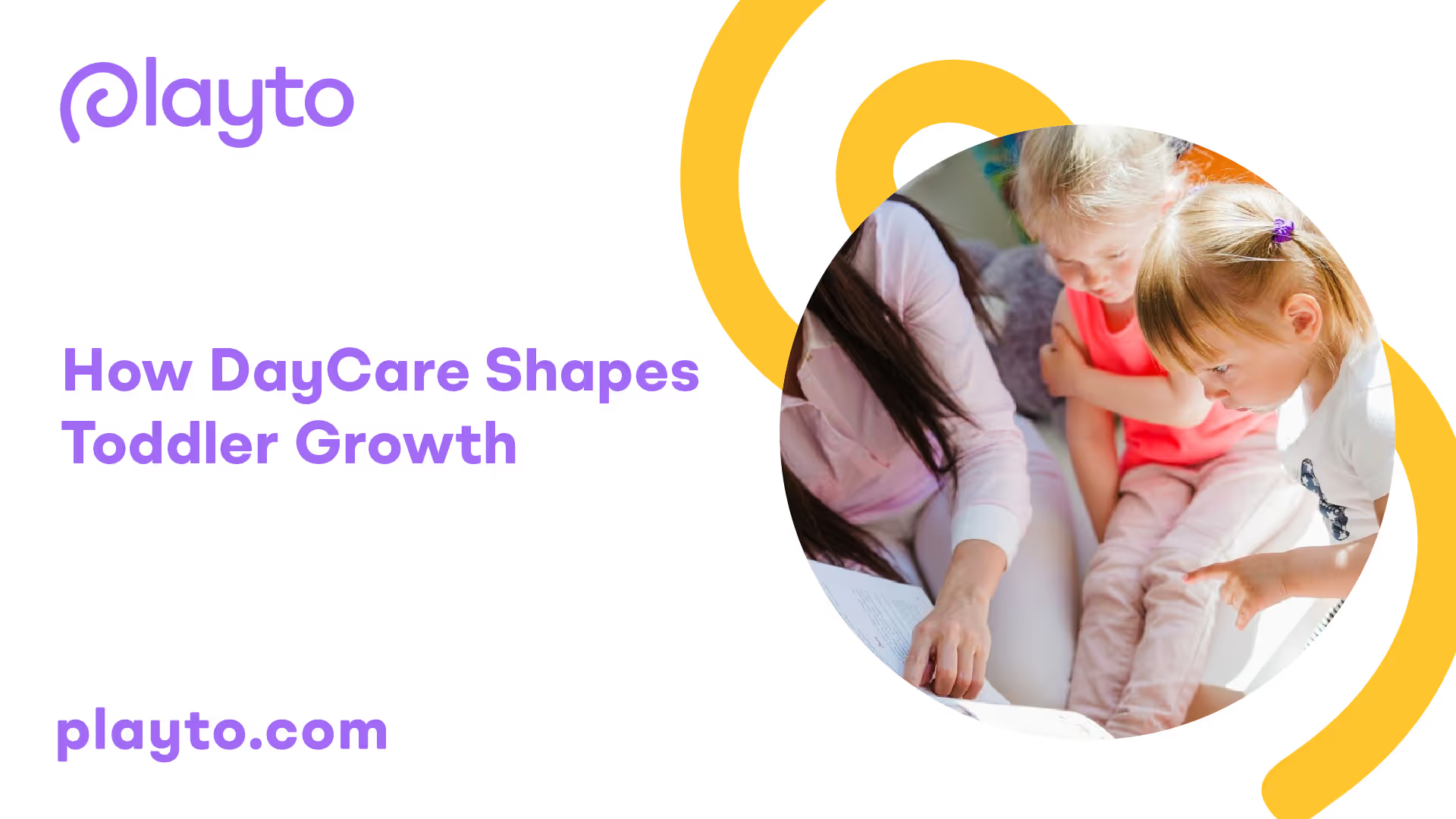
Importance of Daycare
Daycare plays a critical role in the growth and development of toddlers. It not only supports their developmental milestones but also provides essential social learning opportunities.
Developmental Milestones
Children reach significant milestones in various areas such as play, learning, speech, behavior, and movement. These milestones include skills like taking a first step, smiling for the first time, and waving "bye bye". The daycare environment offers structured opportunities for toddlers to practice these skills in a safe setting.
Developmental Area Milestone Examples
- Physical: Crawling, walking, running
- Social: Smiling, waving, playing with others
- Cognitive: Problem-solving, exploring new toys
- Language: Babbling, saying first words, following simple instructions
Social Learning Opportunities
Socialization techniques learned during early play and daycare experiences, such as sharing, taking turns, and forming friendships, lay the groundwork for future relationships with family members, friends, and coworkers. Interacting with other children and adults in a structured and supervised daycare setting encourages toddlers to develop critical social skills more rapidly.
Children in daycare often exhibit better verbal and social skills at a younger age compared to those who do not attend daycare. This improvement is largely due to engagement with peers, which fosters effective communication and self-expression [3].
Furthermore, preschool provides valuable opportunities for toddlers to interact with their peers, enhancing skills such as communication, sharing, and cooperation. Through activities like cooperative games and playtime, children learn to navigate social situations, develop empathy, and understand the value of teamwork.
For more insights on the benefits of daycare, visit our article on daycare benefits for toddlers.

Quality of Daycare
The quality of daycare plays a significant role in shaping toddler growth. Various characteristics define high-quality care, and the interactions between caregivers and children are crucial for optimal development.
Characteristics of High-Quality Care
High-quality daycare is associated with positive outcomes for children, including enhanced social skills and readiness for school. Key characteristics of high-quality care include:
- Higher Adult-Child Ratios: Ensures that children receive more individual attention.
- Responsive Caregiving: Caregivers who are sensitive and responsive to children's needs foster better emotional and cognitive development.
- Cognitive and Language Stimulation: Environments that provide ample opportunities for verbal interaction and cognitive challenges support language development and critical thinking skills.
A study by the Institute for Family Studies indicates that higher quality daycare is linked to better cognitive performance and reduced behavioral issues in children. These benefits can persist into adolescence and contribute to higher academic achievement.
Characteristic Importance
- Adult-Child Ratios: More individualized attention
- Responsive Caregiving: Fosters emotional security
- Cognitive Stimulation: Enhances language and problem-solving skills
Impact of Caregiver Interaction
The quality of interactions between caregivers and children is a critical factor in daycare settings. Studies show that the language used by caregivers is one of the most significant predictors of children’s cognitive and language outcomes in high-quality child care environments [5].
Caregivers who engage in ample verbal communication, provide cognitive challenges, and demonstrate sensitivity can positively influence children's development. Stability and skill among childcare providers also contribute to high-quality interactions, which are essential for children's growth and learning.
Regulated child care centers generally exhibit more positive caregiving behaviors compared to unregulated settings, leading to better developmental outcomes.
To explore more about how daycare can benefit toddlers, check our article on daycare benefits for toddlers. For parents considering options, our guide on choosing the best toddler daycare can provide useful insights.

Social Skills Development
Daycare plays a vital role in the development of social skills among toddlers. Through various interactions and structured activities, children learn essential life skills that are crucial for their growth and future relationships.
Interaction with Peers
Interacting with peers in a daycare setting allows toddlers to practice important socialization techniques. High-quality daycare centers encourage sharing, taking turns, and forming friendships. These foundational skills shape their future interactions with family members, friends, and co-workers. As children engage in cooperative games and playtime, they learn to navigate social situations effectively.
Social Skill Description
- Sharing: Learning to give and receive toys or resources
- Taking Turns: Understanding the importance of patience in interactions
- Forming Friendships: Building connections with peers through shared activities
- Problem-Solving: Collaborating with others to find solutions during play
Learning Empathy and Cooperation
Daycare provides an excellent environment for toddlers to develop empathy and cooperation. Through structured activities, children are encouraged to understand and respect the feelings of others. This learning occurs naturally as they participate in group activities, where they must consider their peers’ emotions and perspectives. Older children often take on mentorship roles, helping younger children navigate social interactions, which reinforces their own understanding of empathy and kindness.
High-quality daycare centers also teach conflict-resolution techniques, compromise, and the value of teamwork. These experiences not only enhance social skills but also help ease separation anxiety and build confidence in children.
Empathy Skill Description
- Understanding Feelings: Learning to recognize emotions in oneself and others
- Kindness: Practicing acts of compassion and support toward peers
- Cooperation: Working together to achieve common goals
- Good Sportsmanship: Learning to handle wins and losses gracefully
Through these interactions and learning opportunities, daycare shapes the way children develop their social skills, paving the way for stronger relationships and better communication as they grow. For more insights on the benefits of daycare, check out our article on daycare benefits for toddlers.
Cognitive Growth
Cognitive development in toddlers is significantly influenced by their experiences in daycare settings. During this crucial phase, children develop essential skills, including language and communication abilities, as well as problem-solving skills.
Language and Communication Skills
Daycare environments provide toddlers with numerous opportunities to enhance their language and communication skills. When children are in daycare, they learn the basics of early education, communicate effectively, and increase their vocabulary, which is vital for their cognitive development and ability to focus on tasks.
Studies have shown that the language used by caregivers is a critical predictor of children's cognitive and language outcomes in high-quality childcare settings. Regular interaction with caregivers and peers helps toddlers learn to express their thoughts and feelings, leading to improved language skills.
Age Group Average Vocabulary Size Cognitive Score Improvement
- 24 Months: 50 - 200 words; higher in high/medium quality care
- 36 Months: 200 - 1,000 words; effect sizes from d = .12 to d = 1.23
Problem-Solving Abilities
Daycare also fosters the development of problem-solving abilities. Children who attend daycare have an easier time learning abstract thinking than those who do not, as they gain experience interacting with others during playtime activities.
In high-quality daycare settings, toddlers are encouraged to explore, ask questions, and think critically. Engagement in group activities and structured play often presents challenges that require cooperation and innovative thinking, enhancing their overall problem-solving skills.
Care Quality Cognitive Skill Enhancement
- High Quality: Significant improvement
- Medium Quality: Moderate improvement
- Low Quality: Minimal or negative impact
Research indicates that children's cognitive scores were notably higher in high or medium-quality care compared to low-quality care at 24 months of age [8]. Consequently, the quality of daycare plays a crucial role in fostering cognitive growth, impacting not only language and communication skills but also essential problem-solving capabilities.
For more insights into the benefits of daycare, check out our article on daycare benefits for toddlers and tips for choosing the best toddler daycare.
Emotional Development
Emotional development in toddlers is significantly influenced by their experiences in daycare. A high-quality daycare environment fosters emotional growth, helping children learn to manage their emotions and resolve conflicts effectively.
Managing Emotions
Daycare provides a structured environment that encourages emotional development. Through activities like storytelling and role-playing, children learn to recognize and express their emotions. This process is vital for developing emotional intelligence, which is crucial for forming strong social bonds and building resilience.
In daycare settings, caregivers often guide children in identifying their feelings, whether it’s happiness, sadness, or frustration. This support helps them learn appropriate ways to express these emotions, leading to better emotional regulation. Children who can manage their emotions are generally better equipped to handle challenges later in life.
Emotional Skills Description
- Recognition of Emotions: Identifying feelings in themselves and others
- Expression of Emotions: Communicating feelings appropriately
- Emotional Regulation: Managing emotions effectively in various situations
Conflict Resolution Skills
Conflict resolution is another essential skill that toddlers develop in daycare. As they interact with peers, conflicts may arise, allowing children to learn the importance of compromise, negotiation, and problem-solving.
High-quality daycare environments create opportunities for children to navigate disagreements in a safe space. Through guided interactions, children learn how to approach conflicts constructively, which prepares them for future social interactions. The skills learned in these early experiences are foundational for maintaining healthy relationships throughout their lives.
Conflict Resolution Skills Description
- Compromise: Finding a mutually acceptable solution
- Negotiation: Discussing differences to reach an agreement
- Problem-Solving: Identifying solutions to conflicts
The emotional growth fostered in daycare settings not only enhances a child's interpersonal skills but also contributes to their overall development. To learn more about the benefits of daycare and how it shapes toddler growth, explore our article on daycare benefits for toddlers. For tips on selecting the right daycare, check out our guide on choosing the best toddler daycare.
Long-Term Effects
The impact of daycare on toddler growth extends beyond immediate developmental benefits. Research indicates significant long-term effects on academic readiness and behavioral outcomes.
Academic Readiness
Quality daycare plays a crucial role in preparing children for academic success. Studies reveal that higher quality daycare, characterized by better adult-child ratios and positive caregiving, is linked to improved cognitive performance. These benefits often persist into adolescence and young adulthood, resulting in higher academic achievement and even admission to more selective colleges.
Quality of Daycare Academic Outcomes
- High-Quality Care: Higher cognitive performance, better grades
- Low-Quality Care: Increased risk of academic challenges
Additionally, high-quality child care fosters essential cognitive and language stimulation, which contributes to readiness for school. Children in nurturing environments are more likely to cooperate with adults and develop social skills with peers, further enhancing their academic preparedness.
Behavioral Outcomes
While daycare can support growth, extensive hours in non-maternal care during early life may lead to challenges in social competence and behavioral issues. Research indicates that children who spend a significant amount of time in daycare exhibit more externalizing behaviors and conflicts with teachers.
Time Spent in Daycare Behavioral Outcomes
- Extensive Hours: Higher likelihood of externalizing problems
- Limited Hours: Lower risk of behavioral issues
These behavioral challenges often manifest as difficulties in cooperation and increased conflict, which can affect a child's social-emotional development and lead to challenges in later academic settings. It's essential for parents to consider the balance of daycare time and quality to support healthy toddler growth.
For more insights on maximizing the benefits of daycare, check our articles on daycare benefits for toddlers and choosing the best toddler daycare.
References
- [1]: https://www.cdc.gov/ncbddd/actearly/milestones/index.html
- [2]: https://www.horizoneducationcenters.org/blog/the-benefits-of-socialization-for-children-in-daycare-settings
- [3]: https://www.quora.com/What-impact-does-daycare-have-on-child-development
- [4]: http://www.trianglelearningcenter.org/the-crucial-role-of-preschool-in-developing-a-childs-social-skills/
- [5]: https://www.hanen.org/Helpful-Info/Articles/Does-child-care-make-a-difference-to-childrens-de.aspx
- [6]: https://www.ncbi.nlm.nih.gov/books/NBK225555/
- [7]: https://www.quora.com/Why-is-cognitive-development-is-important-in-daycare-centers
.avif)